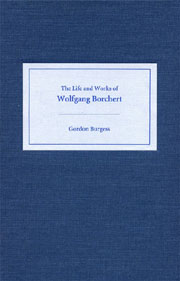Book contents
- Frontmatter
- Contents
- Acknowledgments
- List of Abbreviations
- Introduction
- 1 Childhood, School, Apprenticeship: 1921–1940
- 2 “The Happiest Time of My Life': January–June 1941
- 3 The Eastern Front and Courts-Martial: 1941–1943
- 4 Actor Turned Writer: Jena, Hamburg, and Basel: 1944–1947
- 5 The Poems
- 6 Draussen vor der Tür
- 7 The Short Stories
- 8 The Reception of Borchert's Life and Works
- Conclusion
- Published Works Cited
- Index
Conclusion
Published online by Cambridge University Press: 05 February 2013
- Frontmatter
- Contents
- Acknowledgments
- List of Abbreviations
- Introduction
- 1 Childhood, School, Apprenticeship: 1921–1940
- 2 “The Happiest Time of My Life': January–June 1941
- 3 The Eastern Front and Courts-Martial: 1941–1943
- 4 Actor Turned Writer: Jena, Hamburg, and Basel: 1944–1947
- 5 The Poems
- 6 Draussen vor der Tür
- 7 The Short Stories
- 8 The Reception of Borchert's Life and Works
- Conclusion
- Published Works Cited
- Index
Summary
THE BRIEF SURVEY OF critical literature given in the introductory chapter was designed to provide the academic context in which this account of Borchert's life and work has been written. In the last chapter, we have looked at the popular image of Borchert. That image was, to a great extent, created and fixed by Bernhard Meyer-Marwitz's “Nachwort,” which has been reprinted — with only minor changes — in the Gesamtwerk since 1949. The view of Borchert as a naïve writer, screaming his work into existence against all the odds of his debilitating illness, remained largely unchanged for half a century. Allied to this are the questions over Borchert's alleged nihilism and refutation thereof, and a simplification of his anti-war stance into a somewhat trite pacifism that could repeatedly be applied to the conflict of the day.
Borchert's image in (West) Germany was further ossified by generations of — no doubt well-meaning — secondary-school teachers, who exploited his texts to convey a moral or political message, particularly in the service of Vergangenheitsbewältigung. Borchert became the Schulbuchautor par excellence, one whose works were read under duress in class. But even this treatment failed to destroy his lasting appeal, and there is evidence that his works are becoming rehabilitated in Germany as worthy of academic research. Outside Germany, while his works have not reached a wide public, they have also not experienced the sort of prejudice and pigeonholing to which they were subjected in his own country.
- Type
- Chapter
- Information
- The Life and Works of Wolfgang Borchert , pp. 234 - 236Publisher: Boydell & BrewerPrint publication year: 2003

